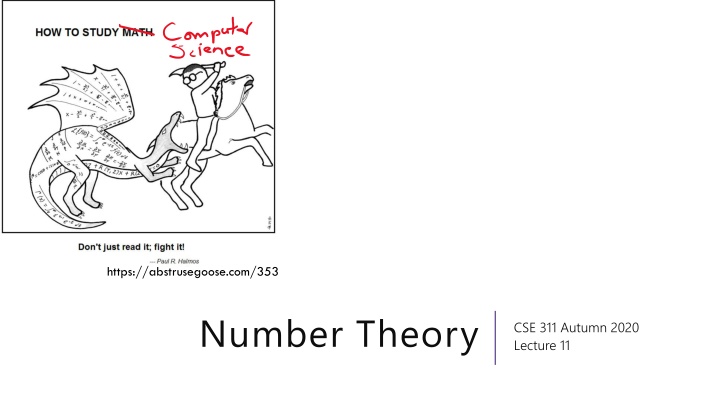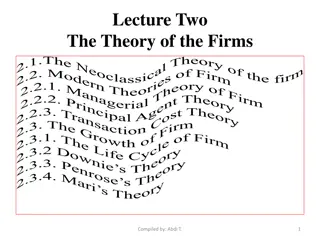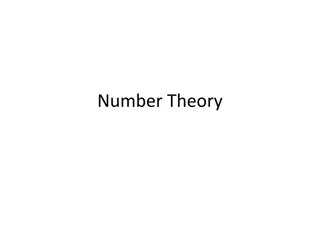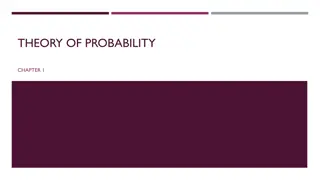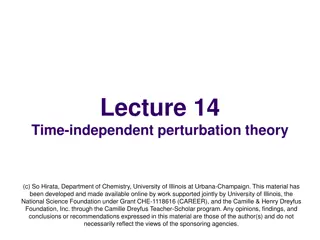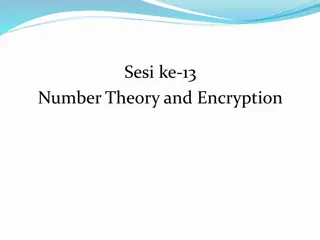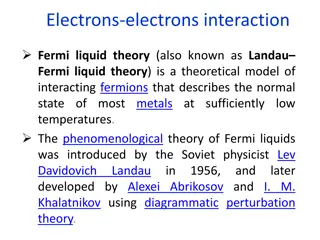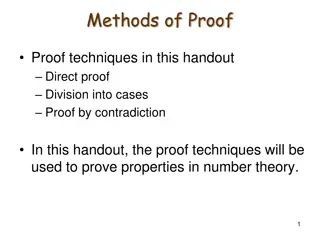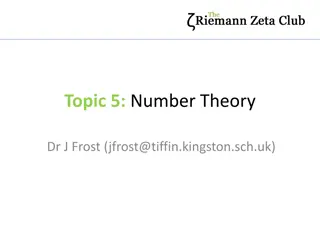Introduction to Number Theory Basics
Learn about fundamental concepts in number theory including set operations, divides, unique division theorem, and the importance of number theory in computer science and cryptography. Practice English proofs, understand powersets, and explore the application of modular arithmetic. Delve into the Cartesian product and the division theorem, gaining insights into the realm of integers and prime numbers.
Download Presentation

Please find below an Image/Link to download the presentation.
The content on the website is provided AS IS for your information and personal use only. It may not be sold, licensed, or shared on other websites without obtaining consent from the author.If you encounter any issues during the download, it is possible that the publisher has removed the file from their server.
You are allowed to download the files provided on this website for personal or commercial use, subject to the condition that they are used lawfully. All files are the property of their respective owners.
The content on the website is provided AS IS for your information and personal use only. It may not be sold, licensed, or shared on other websites without obtaining consent from the author.
E N D
Presentation Transcript
https://abstrusegoose.com/353 Number Theory CSE 311 Autumn 2020 Lecture 11
Announcements Lots of folks sounded concerned about English proofs in sections. THAT S NORMAL English proofs aren t easy the first few times (or the next few times sometimes not even after a decade ) Keep asking questions! Don t expect breakout room activities to be easy. If you know the right answer immediately, you won t learn much by doing it.
Last Time Went reaaaaaaaaaaaal fast so we could practice proofs in section and slowly today. We ll keep practicing in the background.
Two More Set Operations Given a set, let s talk about it s powerset. ? ? = {X:X is a subset of ?} The powerset of ? is the set set of all subsets of ?. ? 1,2 = { , 1 , 2 , 1,2 }
Two More Set Operations ? ? = ?,? :? ? ? ? Called the Cartesian product of ? and ?. is the real plane ordered pairs of real numbers. 1,2 1,2,3 = { 1,1 , 1,2 , 1,3 , 2,1 , 2,2 , 2,3 }
Divides Divides For integers ?,? we say ?|?( ? divides ? ) iff there is an integer ? such that ?? = ?. Which of these are true? 2|44|22| 2 5|00|51|5
Why Number Theory? Applicable in Computer Science hash functions (you ll see them in 332) commonly use modular arithmetic Much of classical cryptography is based on prime numbers. More importantly, a great playground for writing English proofs.
A useful theorem The Division Theorem For every ? , ? with ? > ? There exist unique integers ?,? with 0 ? < ? Such that ? = ?? + ? Remember when non integers were still secret, you did division like this? ?is the quotient ?is the remainder
Unique The Division Theorem For every ? , ? with ? > ? There exist unique integers ?,? with 0 ? < ? Such that ? = ?? + ? unique means only one .but be careful with how this word is used. ? is unique, given given ?,?. it still depends on ?,?but once you ve chosen ? and ? unique is not saying ? ?,? ?(?,?,?) It s saying ?,? ?[? ?,?,? ? ?,?,? ? = ? ]
A useful theorem The Division Theorem For every ? , ? with ? > ? There exist unique integers ?,? with 0 ? < ? Such that ? = ?? + ? The ? is the result of a/d (integer division) in Java The ? is the result of a%d in Java That s slightly a lie, ? is always non- negative, Java s % operator sometimes gives a negative number.
Terminology You might have called the % operator in Java mod We re going to use the word mod to mean a closely related, but different thing. Java s % is an operator (like + or ) you give it two numbers, it produces a number. The word mod in this class, refers to a set of rules
Modular arithmetic arithmetic mod 12 is familiar to you. You do it with clocks. What s 3 hours after 10 o clock? 1 o clock. You hit 12 and then wrapped around 13 and 1 are the same, mod 12 -11 and 1 are the same, mod 12 We don t just want to do math for clocks what about if we need
Modular Arithmetic To say the same we don t want to use = that means the normal = We ll write 13 1(mod 12) because equivalent is like equal, and the modulus we re using in parentheses at the end so we don t forget it.
Modular arithmetic We need a definition! We can t just say it s like a clock Pause what do you expect the definition to be? Is it related to % ?
Modular arithmetic We need a definition! We can t just say it s like a clock Pause what do you expect the definition to be? Equivalence in modular arithmetic Let ? ,? ,? and ? > 0. We say ? ? (??? ?) if and only if ?|(? ?) Huh?
Long Pause It s easy to read something with a bunch of symbols and say yep, those are symbols. and keep going STOP Go Back. You have to fightthe symbols they re probably trying to pull a fast one on you. Same goes for when I m presenting a proof you shouldn t just believe me I m wrong all the time! You should be tryingto do the proof with me. Where do you think we re going next?
So, why? Equivalence in modular arithmetic Let ? ,? ,? and ? > 0. We say ? ? (??? ?) if and only if ?| (? ?) What does it mean to be the same in clock math If I divide by 12 then I get the same remainder.
Another try Equivalence in modular arithmetic (correct, but bad) Let ? ,? ,? and ? > 0. We say ? ? (??? ?) if and only if the ? guaranteed by the division theorem is equal for ?/? and ?/? The Division Theorem For every ? , ? with ? > ? There exist unique integers ?,? with 0 ? < ? Such that ? = ?? + ?
Another Try Equivalence in modular arithmetic (correct, but bad) Let ? ,? ,? and ? > 0. We say ? ? (??? ?) if and only if the ? guaranteed by the division theorem is equal for ?/? and ?/? This is a perfectly good definition. No one uses it. Let s say you want to prove ? ? mod ? ? + ? ? + ? (mod ?) So, uhh, who wants to divide ? + ? by ? and figure out what the remainder is?
Once More, with feeling Equivalence in modular arithmetic (correct, but bad) Let ? ,? ,? and ? > 0. We say ? ? (??? ?) if and only if the ? guaranteed by the division theorem is equal for ?/? and ?/? How do humans check if numbers are equivalent? You subtract 12 as soon as the number gets too big, and make sure you end up with the same number (i.e. ?) So ? is ? + 12? for some integer ? and ? is ? + 12? for some integer ? So b ? = ? + 12? ? + 12? = 12(? ?)
Now I see it Equivalence in modular arithmetic Let ? ,? ,? and ? > 0. We say ? ? (??? ?) if and only if ?|(? ?) So, is it actually better? Prove for all ?,?,?,? ,? 0:? ? mod ? ? + ? ? + ? (mod ?)
Claim: for all ?,?,?,? ,? 0:? ? mod ? ? + ? ? + ? (mod ?) Before we start, we must know: 1. What every word in the statement means. 2. What the statement as a whole means. 3. Where to start. 4. What your target is. Divides For integers ?,? we say ?|?( ? divides ? ) iff there is an integer ? such that ?? = ?. Fill out the poll everywhere for Activity Credit! Go to pollev.com/cse311 and login with your UW identity Or text cse311 to 22333 Equivalence in modular arithmetic Let ? ,? ,? and ? > 0. We say ? ? (??? ?) if and only if ?|(? ?)
Claim: ?,?,?,? ,? 0:? ? mod ? ? + ? ? + ? (mod ?) Proof: Let ?,?,?,? be arbitrary integers with ? 0, and suppose ? ?(mod ?). Divides For integers ?,? we say ?|?( ? divides ? ) iff there is an integer ? such that ?? = ?. Equivalence in modular arithmetic Let ? ,? ,? and ? > 0. We say ? ? (??? ?) if and only if ?|(? ?) ? + ? ? + ? (mod ?)
A proof Claim: ?,?,?,? ,? 0:? ? mod ? ? + ? ? + ? (mod ?) Proof: Let ?,?,?,? be arbitrary integers with ? > 0, and suppose ? ?(mod ?). By definition of mod, n|(? ?) By definition of divides, ?? = (? ?) for some integer ?. Adding and subtracting c, we have ?? = ( ? + ? a + c ). Since ? is an integer ?|( ? + ? ? + ? ) By definition of mod, ? + ? ? + ? (mod ?)
You Try! Claim: for all ?,?,?,? ,? > 0: If ? ? (??? ?) then ?? ?? (??? ?) Before we start we must know: 1. What every word in the statement means. 2. What the statement as a whole means. 3. Where to start. 4. What your target is. For integers ?,? we say ?|?( ? divides ? ) iff there is an integer ? such that ?? = ?. Divides Equivalence in modular arithmetic Let ? ,? ,? and ? > 0. We say ? ? (??? ?) if and only if ?|(? ?)
Claim: for all ?,?,?,? ,? > 0: If ? ? (??? ?) then ?? ?? (??? ?) Proof: Let ?,?,?,? be arbitrary integers with ? > 0 and suppose ? ?(??? ?). ?? ?? (??? ?)
Claim: for all ?,?,?,? ,? > 0: If ? ? (??? ?) then ?? ?? (??? ?) Proof: Let ?,?,?,? be arbitrary integers with ? > 0 and suppose ? ?(??? ?). By definition of mod ?|(? ?) By definition of divides, ?? = ? ? for some integer ? Multiplying both sides by ?, we have ? ?? = ?? ??. Since ? and ? are integers, ?|(?? ??) by definition of divides. So, ?? ?? (??? ?), by the definition of mod.
Dont lose your intuition! Let s check that we understand intuitively what mod means: ? 0 (mod 2) ? is even Note that negative (even) ? values also make this true. 1 19 (mod 5) This is true! They both have remainder 4 when divided by 5. ? 2 (mod 7) This is true as long as ? = 2 + 7? for some integer ?
